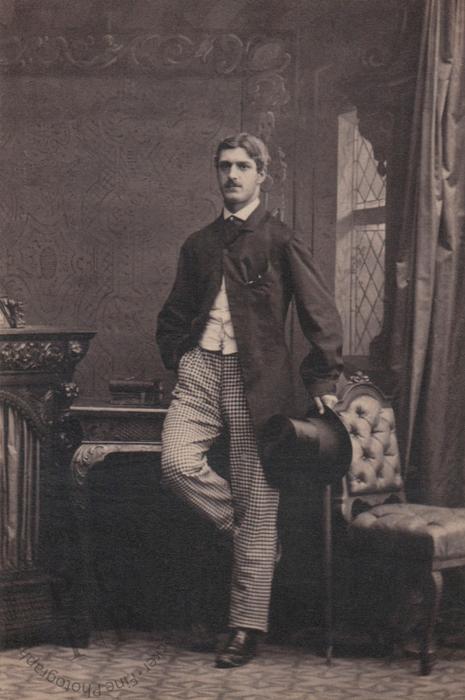W.W. Brown, Esq.
(1837-1914)
18 June 1862
Volume 7, page 152, sitting number 8854.
[The sitter is identified as ‘W.W. Brown, Esq.’ in the Silvy daybooks. The preceding entry is his mother, Mrs Elizabeth Harriet Matilda Brown.]
Born in Bristol on 28 June 1837, William Wreford Brown was the son of Samuel Brown and his wife Elizabeth Harriet Matilda née Cornish.
William was baptised on 15 March 1840 at St John the Baptist, Bedminster. Bristol. According to the baptism register, Samuel was a ‘tanner.’ The 1841 census confirms this.
William appears on the 1851 census living with his widowed mother, who was a ‘Proprietor of Houses,’ his three siblings and three female servants.
In May 1859 he joined the Royal North Gloucester Regiment with the rank of Ensign (St James’s Chronicle, 28 May 1859).
On 20 October 1864, at Christ Church in Clifton, he married Clara Jane Clark, eldest daughter of the late Henry Clark, a surgeon, of Berkeley Square, Bristol. William gave ‘Esquire’ as his rank and described his father Samuel as a ‘Gentleman.’
The couple appear on the 1871 census living at 27 Royal York Crescent in Clifton. Their marriage had already produced three sons and two daughters; the younger daughter was three months old. The household included three servants. William described himself as a ‘Captain in the North Gloucester Militia.’
William Wreford Brown died, aged 77, on 22 December 1914 at 5 Litfield Place, Clifton, Bristol. He left an estate valued at £51,551.
‘Mr William Wreford-Brown, whose death at the age of 77 we announced yesterday, was well known in Clifton social circles, and at one time he was a familiar figure in the hunting field. He was one of the founders and main supporters of the Clifton Club, and as a whist player he had a great reputation. Some of his sons have achieved renown in amateur sport, the number of good sportsmen being quite exceptional in one family. Mr Wreford-Brown was himself very hardy, and in the bitterest weather he would scorn to wear an overcoat. He had a large circle of friends, who will learn of his death with sincere regret. He had all the qualities of what Dr Johnson called “a clubbable man.”’ (Bristol Times and Mirror, 24 December 1914).
‘His sons are well known in the sporting world, especially in football and cricket. Mr C. Wreford-Brown became famous in Association football, and on more than one occasion represented England in international games. He also played occasionally for Gloucestershire in county cricket’ (Gloucester Journal, 26 December 1914).
[I have nor been able to discover where the money in the family came from. Considering his father was a tanner when he was born, it’s surprising that William left an estate valued at £51,551, the equivalent of over £5 million in today’s money. According to several trees on Ancestry, his father Samuel was the inventor of the gas vacuum engine and the screw propeller but nothing in the inventor’s life matches anything in the tanner’s life and I think that these are two different men with the same name. However, it does seem that it was the father Samuel who changed the family’s fortunes. When his widow — William’s mother — died in 1896, she left an estate valued at a phenomenal £98,670.]

